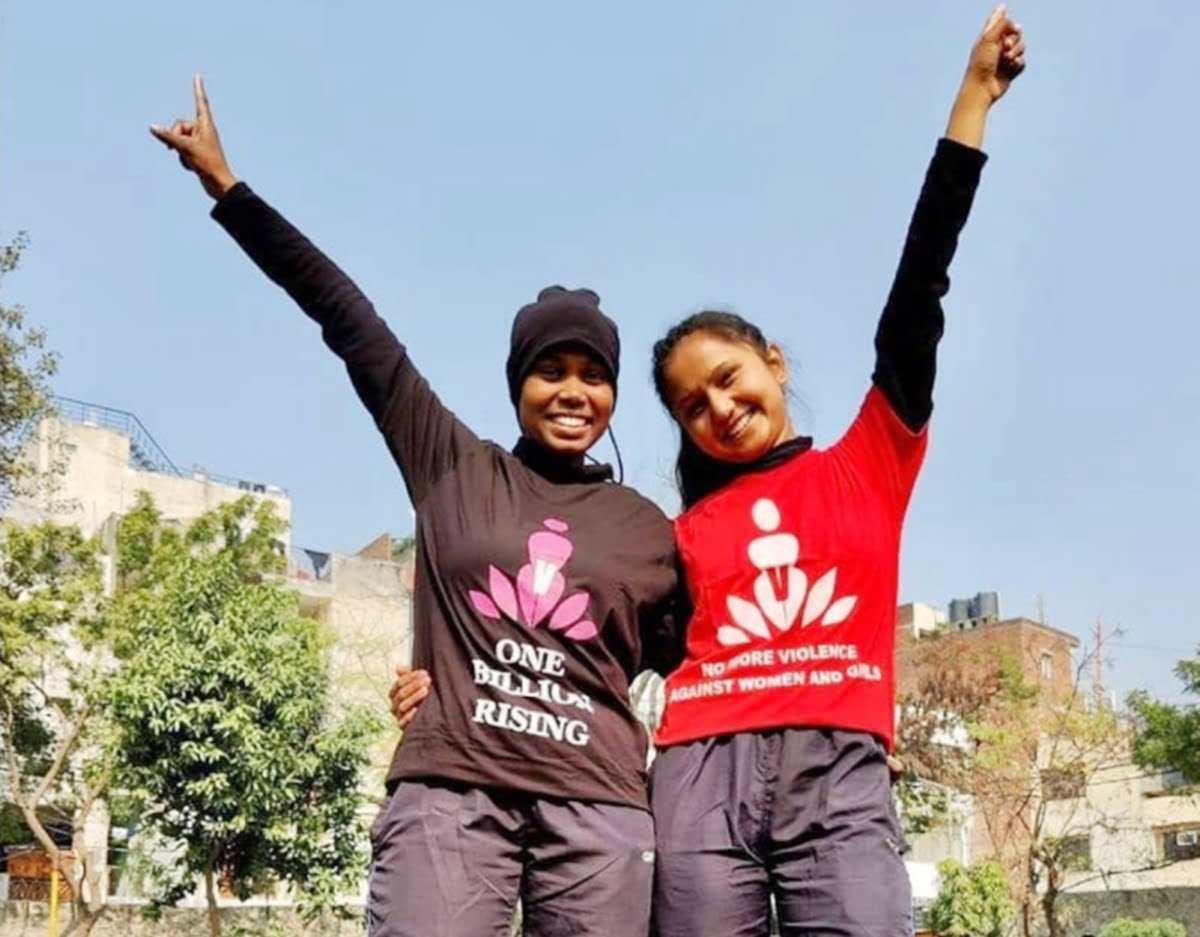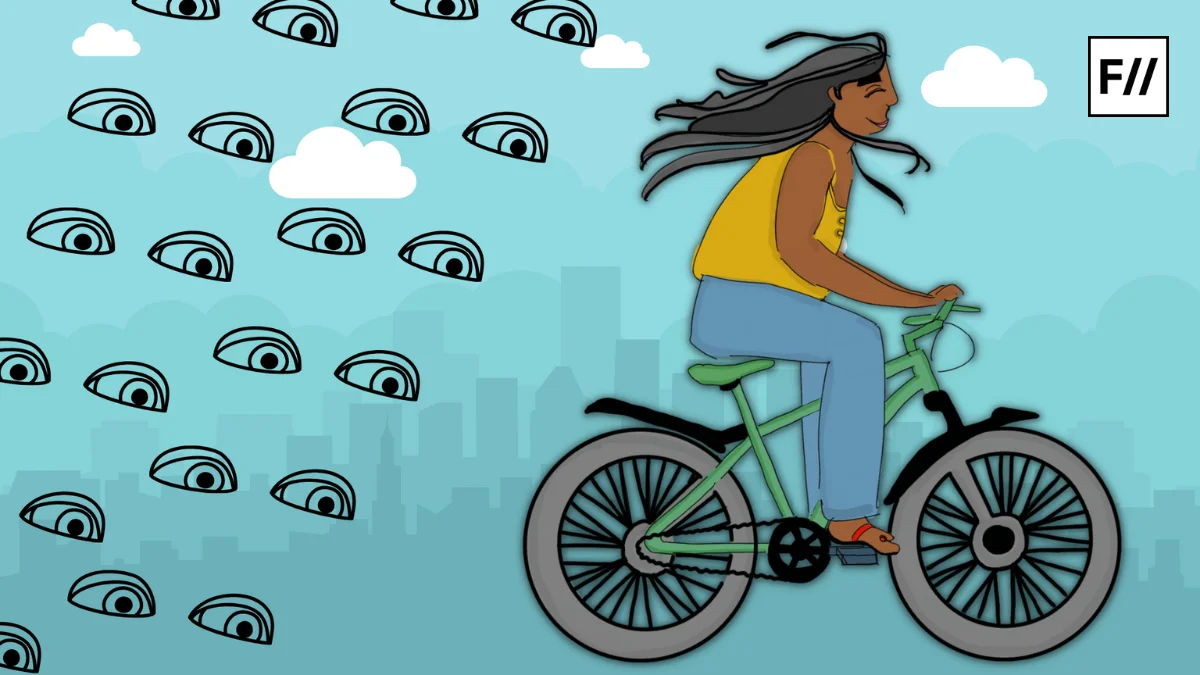Posted by Alpha Arpana Toppo
Two young women, Sabita Mahato and Shruti Rawat, are on an exciting trans-Himalayan cycling adventure to make the world aware of the everyday violence faced by women and girls as well as the violent exploitation of natural resources by capitalist patriarchy. They are being supported by One Billion Rising, South Asia and Young Sangat on their venture through their campaign #RidetoRise.
The Covid-19 pandemic exposed our broken systems while showcasing the increased social and economic fractures in our society, be it through the rampant increase in racism and communalism or the number of domestic violence cases. On the other hand, the reduced number of carbon emissions during the lockdown proved that the global temperature rise can be kept below 1.5°C.
Also read: Can Women Have A ‘Spirit’ for Adventure?: Problems Women Travellers Face
Two young women, Sabita Mahato and Shruti Rawat, are on an exciting trans-Himalayan cycling adventure to make the world aware of the everyday gender-based violence as the violent exploitation of natural resources by capitalist patriarchy.
With rising global temperatures, the Himalayas are one of the world’s most sensitive hotspots to climate change. As a result of unchecked and continued exploitation, the mountains are melting and there is an adverse impact on food, water, and animals.
Meeting people on their way and speaking against gender-based violence, Sabita and Shruti are riding their bicycles through the trans-Himalayan route visiting Punjab, Jammu and Kashmir, Himachal Pradesh, Uttarakhand, Nepal, West Bengal, Sikkim, and Arunachal Pradesh.
Ride To Rise: The first trans-Himalayan expedition by women cyclists
Sabita and Shruti ride with a mission to rise and raise awareness on gender-based violence, promoting the culture of cycling to make a little difference in our everyday living. They have joined the One Billion Rising (OBR) campaign, which aims to create consciousness and use cultural expressions to show that survivors have risen and survived violence. This year, with the theme of Rising Gardens, the campaign calls upon us to work towards healing our communities, our world by growing gardens. This is a symbolic call to raise all kinds of gardens, grow vegetables, and other more metaphorical gardens: the gardens inside us, gardens where friendships and love bloom, gardens of hope, etc.
Sabita, who pedals for women’s safety, says, “When we share about One Billion Rising, people want to know more. Being a girl, my safety is important for me. If we are safe on cycle, if we can claim our own space on the roads, nothing can stop us from achieving our dreams.”
A woman can do all things
Breaking the traditions set by her family, Sabita Mahato, 24 years old, decided to do something in the field of sports and achieve her dreams. The turning point in Sabita’s life was her sister’s marriage. She had grown up seeing her sister play volleyball but only to leave behind her dreams as she was married off at a young age. Sabita remembers how she was often reminded at home that she would face problems if she continued wearing shorts to play volleyball. Today, Sabita is a national volleyball player, a mountaineer and an endurance bike rider. She has completed the all-India solo cycling expedition in 2017, Nepal and Sri Lanka solo cycling expedition in 2018 and 2019 respectively. Sabita dreams of covering a distance of 1 lakh kilometers on her bicycle across the world. With a strong belief that a woman can do all things, Sabita not only broke the chains cast upon her by her family but also brought a change for her younger sisters who were then supported by the family to complete their education.
Sabita also works as a mountaineer trainer at Nehru Institute of Mountaineering, Uttarkashi. This year her friend and student, Shruti Rawat, has joined her along in the trans-Himalayan cycling expedition from February 2, 2021.
Also read: Women Travelling Solo And The Added Baggage They Carry
Backpacks, Meals And Meetings: Their daily plans
With only two sets of clothes, a water bottle, a bag containing a cycle-servicing kit, tube tires, a jacket, essential electronics, and few dry fruits, these women are now set to achieve the first female trans-Himalayan expedition. They are meeting several people on their way, visiting schools, organisations and celebrating the strength of women.
They start each day at 7 am after having a light breakfast and stop cycling before it turns dark. On their way, they drink plenty of juice and have fruits. Speaking about the challenges they say, “the biggest challenge is sitting on the cycling seat for 8-9 hours. We try our best to end our day before it gets dark. Once we couldn’t find ourselves a place to stay till 8 pm so we went kilometers ahead to find ourselves a place to sleep and reached safely. As the night falls, it becomes an unofficial curfew timing for cyclists, not only because we are women but cycling during the night in itself challenging because of the rush on the highway. There is always a sense of fear going to unknown places, whether you are a woman or a man. We keep ourselves alert all the time as we meet hundreds of people on our way, some good, some of a different kind.” Sabita adds that a police personnel was shocked and said, “ Betiyo,(Daughters) why are you doing this? How can your parents allow you to go on your own? What will happen if someone holds you? Are you not afraid? “
They met a woman in Uttarakhand who was surprised to see these young ladies cycling. She questioned them on how they had the courage to cycle for such a long distance. Sabita and Shruti replied to them, “You cannot ride a cycle just like how we cannot go to the jungle to collect woods and carry such heavy load our our heads like you do.”
They met a woman in Uttarakhand who was surprised to see these young ladies riding a bicycle. She questioned them on how they had the courage to cycle for such a long distance. Sabita and Shruti replied to them, “You cannot ride a cycle just like how we cannot go to the jungle to collect woods and carry such heavy load our our heads like you do.”
One wants to rest during period cramps and bloating, but Sabita and Shruti did not take a break. Sabita says, “It is difficult to sit for eight to nine hours on a cycle seat-post during periods. Our body aches but we have prepared ourselves for it. Every week, we cycle uphill for a minimum distance of 30 km which is a similar pain as period cramps.” says Sabita. For Shruti, it was not the same. Shruti felt extremely tired covering a distance of 70-90km with no pain killers and the next day when she took one, she fainted. They stop by public toilets on their way if they find one, otherwise petrol pumps are their stoppage where they fill their water bottles and use the washroom.
On traditional masculine appearance and safety on the roads
When they reach their destination and look for hotels or guest houses, they are often questioned as to why they are cycling. Once they heard the locals say that a husband and wife couple are cycling together, assuming that Sabita is a man as she has short hair. A passerby once commented that Shruti should keep her long hair such that it is not visible or she should hide it inside her jacket so that it appears as if a man is cycling. Shruti replied to him, “I don’t want to look like a man, I am fine with who I am.”
They say, “We are always alert of harassment, our own safety, and physical challenges like body exhaustion. We keep two destinations for our everyday journey, the first is a backup destination if we are too exhausted.” The two have to travel for at least 90 days to complete their expedition.
If you want to learn more about Sabita and Sruti follow Young Sangat on Facebook and Instagram. To support them in the #RidetoRise Campaign, pick up a bicycle and and speak up against patriarchy and violence against women.
Alpha Arpana Toppo is an indigenous woman belonging to the Oraon tribe in Jharkhand. She has completed her M.A in Women Studies from the Tata Institute of Social Sciences. She is currently working with the Young Sangat Network. Her interest lies in youth, indigenous people, migration, and gender. She can be found on Instagram and Twitter.
Featured image source: Instagram
About the author(s)
Sangat is a network of organisations and individuals working towards building and strengthening regional feminist solidarity through capacity building, campaigning and promotion of feminist culture.




